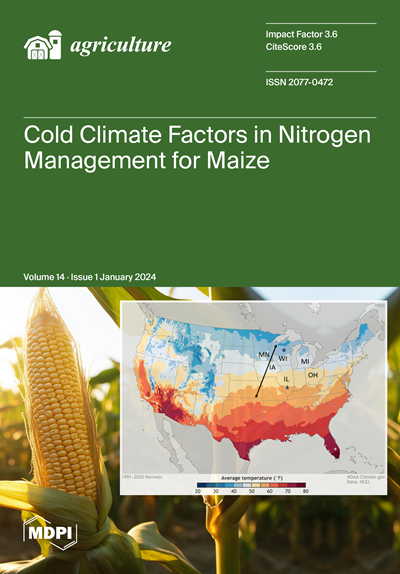绵羊个体面部识别的大型基准数据集
IF 3.6
2区 农林科学
Q1 AGRONOMY
引用次数: 0
摘要
近年来,肉羊养殖业发生了重大变化,从传统的草地放养转向了更加智能化的养殖方式。因此,自动绵羊面部识别系统已成为现代育种实践的关键,并逐渐取代了耳朵标记和其他手动跟踪技术。虽然羊脸数据集已经在以前的研究中引入,但它们通常涉及姿势或背景限制(例如,固定受试者的头部,清洁面部),这限制了数据收集并限制了可用样本集的大小。因此,缺乏专门为评估单个绵羊识别算法而设计的综合基准。为了解决这个问题,本研究开发了一个大规模的基准数据集,Sheepface-107,包括从107个不同的受试者获得的5350张图像。从每只羊的多个角度收集图像,包括正面和背面,在一个多样化的集合中,提供了更全面的面部特征表示。除了数据集之外,通过将多个评估指标应用于三种不同深度学习模型(VGG16、GoogLeNet和ResNet50)产生的结果,开发了一种评估协议,分别获得了83.79%、89.11%和93.44%的f1分数。对每种算法的统计分析表明,准确性和参数数量是评估识别性能时使用的最具信息量的指标。本文章由计算机程序翻译,如有差异,请以英文原文为准。
A Large Benchmark Dataset for Individual Sheep Face Recognition
The mutton sheep breeding industry has transformed significantly in recent years, from traditional grassland free-range farming to a more intelligent approach. As a result, automated sheep face recognition systems have become vital to modern breeding practices and have gradually replaced ear tagging and other manual tracking techniques. Although sheep face datasets have been introduced in previous studies, they have often involved pose or background restrictions (e.g., fixing of the subject’s head, cleaning of the face), which restrict data collection and have limited the size of available sample sets. As a result, a comprehensive benchmark designed exclusively for the evaluation of individual sheep recognition algorithms is lacking. To address this issue, this study developed a large-scale benchmark dataset, Sheepface-107, comprising 5350 images acquired from 107 different subjects. Images were collected from each sheep at multiple angles, including front and back views, in a diverse collection that provides a more comprehensive representation of facial features. In addition to the dataset, an assessment protocol was developed by applying multiple evaluation metrics to the results produced by three different deep learning models: VGG16, GoogLeNet, and ResNet50, which achieved F1-scores of 83.79%, 89.11%, and 93.44%, respectively. A statistical analysis of each algorithm suggested that accuracy and the number of parameters were the most informative metrics for use in evaluating recognition performance.
求助全文
通过发布文献求助,成功后即可免费获取论文全文。
去求助
来源期刊

Agriculture-Basel
Agricultural and Biological Sciences-Food Science
CiteScore
4.90
自引率
13.90%
发文量
1793
审稿时长
11 weeks
期刊介绍:
Agriculture (ISSN 2077-0472) is an international and cross-disciplinary scholarly and scientific open access journal on the science of cultivating the soil, growing, harvesting crops, and raising livestock. We will aim to look at production, processing, marketing and use of foods, fibers, plants and animals. The journal Agriculturewill publish reviews, regular research papers, communications and short notes, and there is no restriction on the length of the papers. Our aim is to encourage scientists to publish their experimental and theoretical research in as much detail as possible. Full experimental and/or methodical details must be provided for research articles.
 求助内容:
求助内容: 应助结果提醒方式:
应助结果提醒方式:


